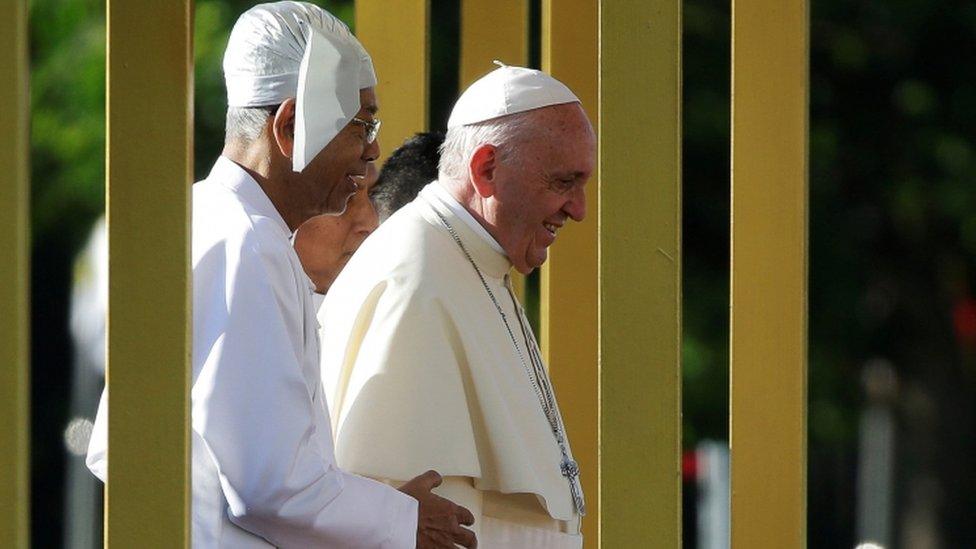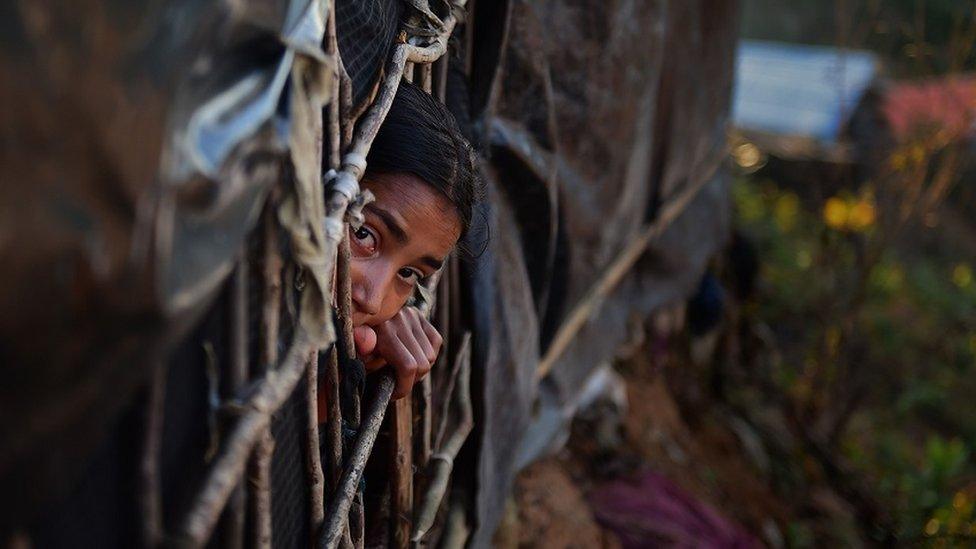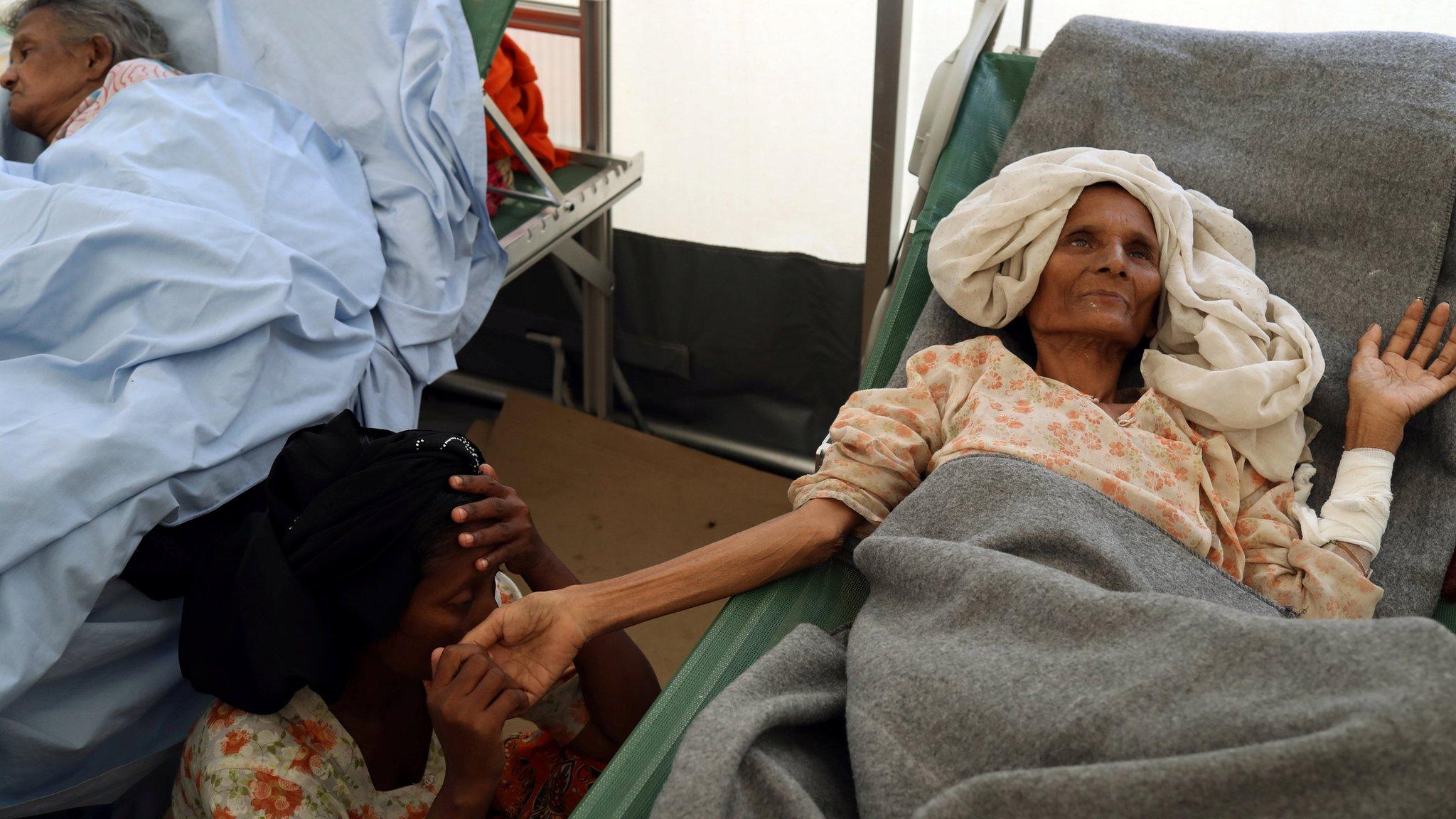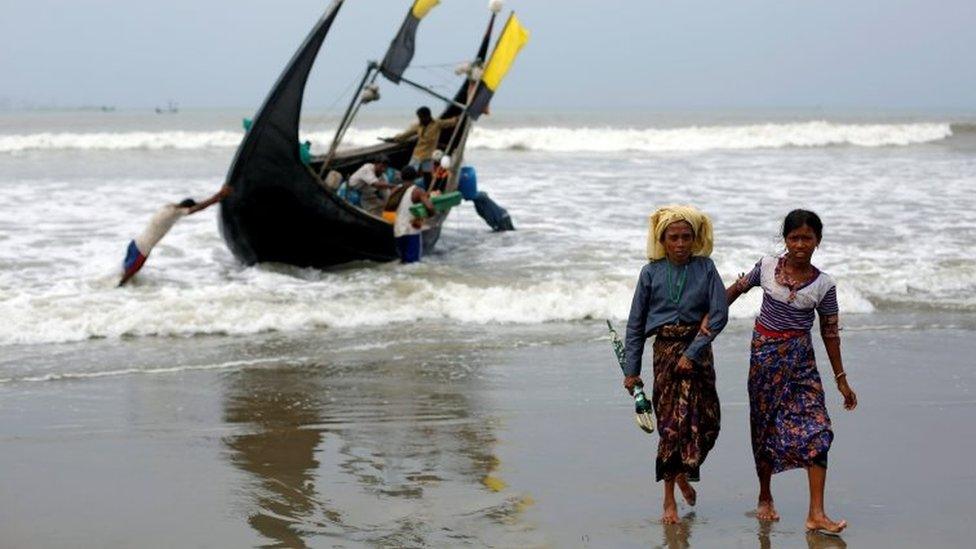Pope makes key Myanmar speech after meeting Aung San Suu Kyi
- Published

Pope Francis was welcomed to the capital by President Htin Kyaw (L)
Pope Francis has met Myanmar's leader Aung San Suu Kyi and is delivering a speech that will be keenly watched for any reference to the country's Rohingya Muslim community.
Myanmar has been accused of ethnic cleansing, with 620,000 Rohingya fleeing to Bangladesh since August.
Francis has in the past supported his Rohingya "brothers and sisters".
But the Catholic Church in Myanmar has urged him not to use the term Rohingya to avoid a backlash against Christians.
The 80-year-old Pope is on the second day of a four-day visit to the country and has travelled from Yangon to the capital, Nay Pyi Taw, to meet Aung San Suu Kyi and deliver his much-anticipated speech.
He has been urged by rights groups to pressure the government over its treatment of the Rohingyas.
Pope Francis is welcomed on his arrival in Myanmar
Myanmar has denied UN accusations that the treatment of the Muslim community amounts to ethnic cleansing. It says the crackdown in Rakhine state, which began after deadly attacks on police posts by Rohingya militants, is to root out violent insurgents.
Myanmar's government also rejects the term Rohingya. It labels the Rohingya as "Bengalis" and says they migrated illegally from Bangladesh so should not be listed as one of the country's ethnic groups. Bangladesh also denies they are its citizens.
Ms Suu Kyi has been criticised for her lack of action. On Monday, the Nobel Peace Prize winner was stripped of the Freedom of the English city of Oxford, with local councillors saying they no longer wished to honour those who turned a blind eye to violence.
Rohingya girls say they were forced into sex work in Bangladesh
In a 40-minute meeting with leaders of the Buddhist, Islamic, Hindu, Jewish and Christian faiths in Yangon (Rangoon), before flying to Nay Pyi Taw, the Pope stressed that each religion had "its riches and traditions".
However, Vatican officials who gave a briefing on the meeting made no mention of any reference to the Rohingya.
The BBC's Jonathan Head, in Yangon, says the pontiff is expected to use his speech to outline his views on how religious tolerance should be built but the wording will be closely watched.
He says the Pope cannot avoid an issue on which he he has been blunt in the past, but if he does become too outspoken, the Buddhist majority here will just not listen to him - so he has a very fine line to tread.
Kate Vigneswaran, from the human rights group Fortify Rights, told the BBC it was important for the Pope to use the term Rohingya.
She said: "The Myanmar government and military have been trying to compel states for some time and other people not to use the term because they want to call them Bengali interlopers or foreigners. So to support that by not using the term I think contributes to that dehumanisation of the Rohingya as a group."

Catholicism in Myanmar

Evidence of Christianity in Myanmar extends back as far as the 13th Century, but Catholic evangelism began in earnest in the 18th Century, when Myanmar was the kingdoms of Ava and Pegu
Catholics make up 1%-1.3% of the 53 million population. Buddhism is the majority religion with about 88%, with Christianity overall accounting for about 6%
About 90% of Catholics in the country are from the Karen, Kachin, Chin, Shan and Kaw ethnic minorities
Censuses over the past 40 years show Christianity is the fastest growing religious group

On the first day of his visit, Pope Francis met Myanmar's military chief, Gen Min Aung Hlaing.
In a Facebook post, the general said he had told the Pope: "There is no religious discrimination in Myanmar as the country ensures religious freedom."
On Wednesday, the Pope is to celebrate a huge Mass in Yangon, which some 200,000 Myanmar Catholics, almost 40% of the country's Catholic community, are expected to attend.
One Catholic who will attend, Daw Ja Hpang, told Reuters: "I'm extremely excited because I thought I would never see the Pope in my life."
Watch: Who are the Rohingya?
After Myanmar, Francis will move on to Bangladesh to meet a small group of Rohingya refugees in a symbolic gesture.
The Pope's trip was planned before the violence erupted in Myanmar in August.
Last week Myanmar and Bangladesh signed a deal to return hundreds of thousands who have fled across the border, but aid agencies have raised concerns about any forcible return.
- Published23 November 2017

- Published22 November 2017

- Published7 September 2017
